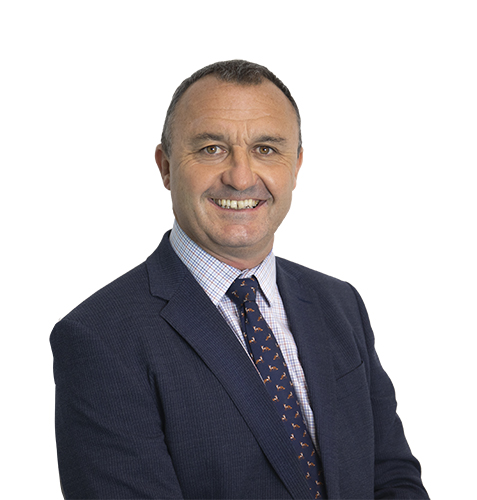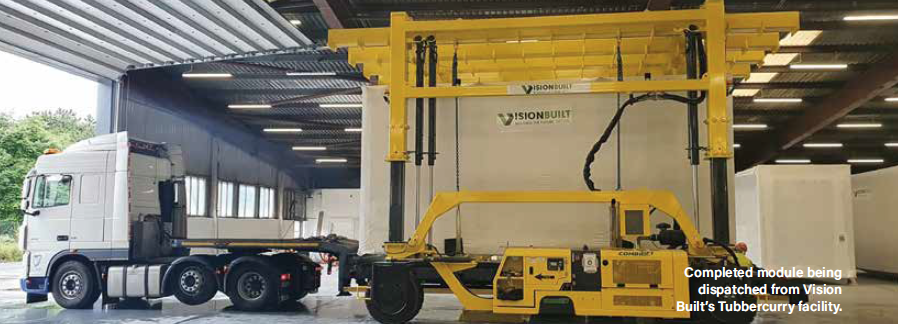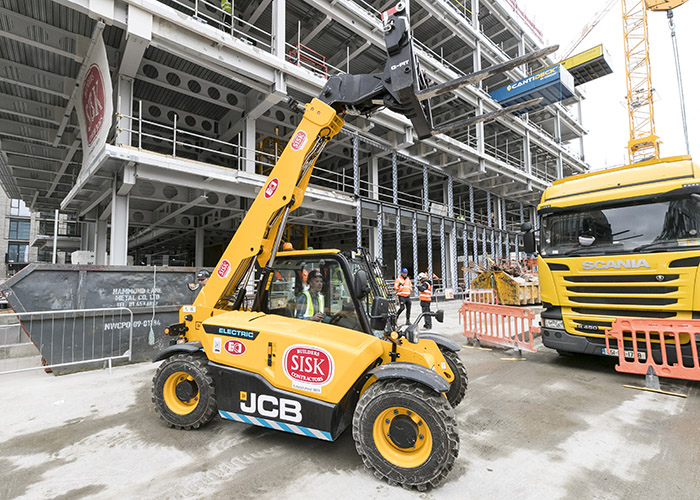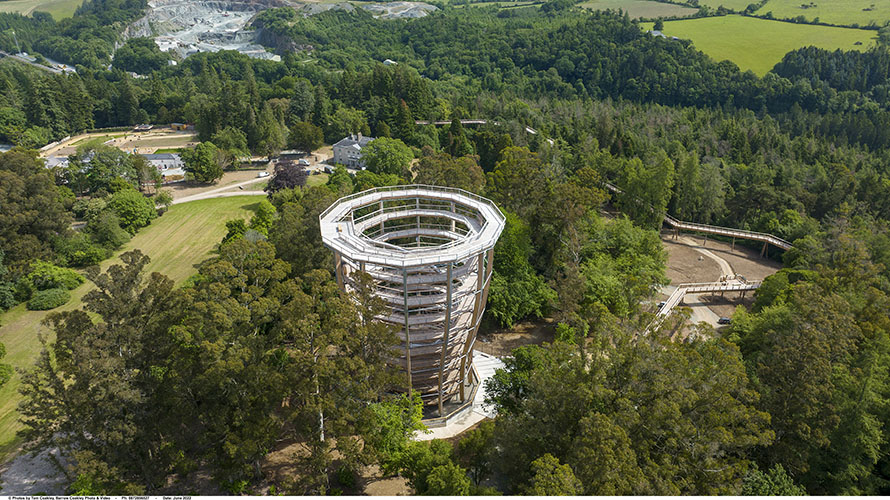Paul Brown sets out his future vision for Sisk

Paul Brown, CEO, John Sisk & Son, tells ROBBIE COUSINS that he has stepped into his new role at a pivotal moment, when Sisk is taking on more ambitious projects, moving towards being a net-zero without offsets contractor and advancing its goal of being a more inclusive and gender-balanced workplace.
Paul Brown took up the position of CEO of John Sisk & Son on 01 January 2022, succeeding Stephen Bowcott, who had been in the role since 2015. Brown joined Sisk in 2013 to lead its UK civil engineering business. Before that, he had been managing director of Balfour Beatty for seven years.
Brown says he initially joined Sisk to take up the challenge of developing its civil engineering operations in the UK. In 2020, he was appointed chief operating officer (COO) for UK Construction and Civil Engineering across the group. He sees his appointment as CEO of Sisk as an opportunity to build on the company’s achievements to date and continue its transition to become a modern, sustainable construction business helping its clients realise their ambitions in a sustainable manner.
He comments: “During the first six months in my new role as CEO, I have been reviewing the business strategy with our board and meeting our people and clients across all sectors and geographies. We have expanded our senior management team in recent months, and I look forward to working with them to develop the business,”
Overall, he says that last year was a challenging year for the business in tough market conditions, in which it delivered a turnover of about €1.4bn, with Ireland accounting for about 48% of that, the UK about 33% and Europe the remaining 19%.
“2021 was challenging for a host of external factors, but we remain in good shape, and this is a testament to the strength of our people who performed really well throughout the challenges Covid-19 presented,” Paul Brown comments. “Covid has not only cost us financially, it has cost us a lot of people emotionally, mentally and motivationally. If we’re to take anything out of the experience of the past two years, we need to learn as an organisation and an industry to move with the times.”
Sisk’s top five sectors by turnover in 2021 were commercial, data centres, residential, life science & tech, and transport.
“The quality of our projects across all sectors was outstanding. We are active across Ireland, the UK and a number of countries in Europe, including Sweden, Netherlands, Denmark and Croatia, and we currently employ approximately 1,900 people in our construction business.”
Paul Brown on Sisk outlook
Paul Brown says that Sisk has a steady pipeline of work in all sectors over the next 24 months with existing and new clients. “I am 100% committed to the success of the Sisk business, continuing its proud legacy and holding up the values and culture of the brand. One example of our capacity and strength is that daa recently selected Sisk/Lagan Joint Venture (JV) to undertake its Dublin Airport Airside and Landside civil engineering framework worth over €325m.
“However it is our people who are our strength. As a senior management team, we can only set the course and ensure the required resources are in place. I want people in Sisk to understand the culture, to feel respected, to feel challenged, and to feel there are genuinely no limits to their career, whatever they want to do. I want them to feel part of the journey and part of the successes and failures. In achieving this, we will retain, attract, recruit and hire better.”
Sisk senior management changes
Sisk has made a number of appointments at senior management level in the past few months. Steven McGee joined as COO, Ireland, to lead the ongoing development of the construction business in Ireland. Donal McCarthy was recently appointed to the newly created role of COO, Data Centres, Life Sciences & Technology, with responsibility across all Sisk territories in those sectors. Mark McGreevy was appointed to the new position of CCO earlier in the year, while Ajaz Shafi took over Paul Brown’s old job as COO for the UK Construction and Civil Engineer Business.
“We are now working on an updated strategy for the business,” Brown explains. “Steve Bowcott took over the business in 2015 during difficult times. He really stabilised it and modernised some of the ways we go about our business in terms of commercial reporting and governance. We have an opportunity to shape and modernise further, and we are working across the business to bring that refreshed strategy forward.”

Sisk team bog restoration with Green Restoration Ireland (GRI), Co Mayo.
Sustainability
In 2020, Sisk published its 2030 Sustainability Roadmap: Building today, Caring for tomorrow. Paul Brown explains that the company is committed to 21 stretching targets aligned to the UN Sustainable Development Goals to ensure it becomes a more sustainable and responsible business.
“During 2021, we established eight working groups to deliver on these targets within our Roadmap. Each working group is sponsored by a board member. A range of actions has been undertaken by the working groups, with three of our 21 targets already achieved. Nine of these activities are on track, while nine are off track, but we have plans to progress each of them. We will soon publish our first-ever Sustainability Report – tracking how we are doing.
“We have had some really great initiatives in the last 12 months, from Bog Restoration in Mayo to getting the first electric-powered telehandler onto a site in Dublin, but we are only at the beginning of the journey.”
Covid-19 response
Paul Brown explains that Covid-19 has presented a significant challenge to the entire construction industry over the past two years, but it has proven itself to be resilient.
“While Sisk was at the forefront of ensuring a safe return to sites for construction workers after the initial lockdown period in May 2020, the entire Irish construction industry must take credit for how we worked together to make our sites safe when many sectors had to close.”
Sector challenges
After Brexit, then Covid-19, and now inflation and the Russian war on Ukraine, the Irish construction sector is being continually challenged by seemingly insurmountable barriers. Yet it is a sector that continues to adapt and get on with the work.
“There is an uncertainty in the market over prices and costs; namely, they are very hard to manage and predict. The race for talent is evident in the current market. Our people are our key asset, and we must strive to retain the great people we have but not chase higher and higher salaries in the short term. We want people to stay with us and join us for the long-term opportunities we offer.
“We put a lot of investment into training and development. This goes back to John Sisk, the founder of the company and his view of people and investing in them to deliver their best.”
Workable contracts
He acknowledges the importance of a sustainable pipeline of public capital investment works for the industry and the economy overall.
“The renewed National Development Plan released this year gives us confidence in the pipeline, but in terms of how it’s delivered, fundamentally, it needs a procurement and contractual mechanism that’s workable for all parties. It’s widely accepted that the current model is outdated and recent events, such as pandemic shutdowns, global supply chain disruption and inflation have brought that to light.
“We note the recent changes the government has made in relation to cost-sharing mechanisms, but much more fundamental reform is required in the near term. Solutions have been shared in terms of improved risk-sharing and collaboration. But the public and private sector need to quickly come together to make it happen now.”
Digital construction
The recent launch of the Build Digital Project establishes a basis for the sector to upskill and become more efficient. Paul Brown sees digital tools as a key part of Sisk’s strategy going forward.
“We have always adopted technology and new ways of working – our Digital Project Delivery approach is at the core of how we work.
“We are delighted in particular with the recognition at the recent ICE Awards for our innovative approach to how we deliver projects and BIM Excellence on the Grangegorman campus project.
“We have committed ourselves to leading on our use of technology and innovation, and it’s part of our culture at Sisk. We are very lucky to have some of the best people in these areas, and we have continually invested in our people as they are the ones who make the technology work. We have a centre of excellence now that supports the business in a collaborative way, and the project teams and clients see the benefits.”

Vision Built
The Covid-19 pandemic and the skills gap triggered a major growth in demand for offsite construction.
“The Irish market has moved quickly towards off-site construction solutions in the past couple of years, and Sisk has developed our off-site capacity in several ways,” he comments. “We acquired Vision Built, based in Galway, in 2019. Vision Built manufactures 2D light gauge steel panels in a factory in Sligo for supply to its customer base in Ireland and the UK. The business continues to serve its existing and new customer base whilst also supporting the growth in Sisk’s own demand for light gauge steel through our residential and commercial construction businesses in Ireland and the UK. It is now at the core of Sisk’s service offering, which is expanding, with offsite fabrication becoming an increasingly important element of delivery.”
Diversity & inclusion
Paul Brown comments that diversity balance is an issue that still needs to be addressed within Sisk and by the construction sector.
“We set up the Building Gender Balance Network in June 2019 with a primary mission to tackle gender imbalance and shortage of female staff within Sisk and our industry. Our equality, diversity and inclusion (EDI) steering group is complemented by a range of focused employee resource groups (ERG). These groups are employee-driven support groups with an agreed mission statement aligned to Sisk EDI objectives. The ERG has hosted a range of activities, including networking events, external speakers, coffee mornings and annual celebrations around International Women’s Week and International Men’s Day.
“We also have been publishing a Gender Pay Gap Report to help us track the issue of different pay for women in our business,” he adds. “Our goal is to ensure that inclusion is part of the fabric of our business and that our culture and environment allow all individuals to thrive and contribute to our success without barriers.
“We recognise the importance of visibility of role models with varied and atypical careers both for our own staff and the wider industry, which is why we have placed more emphasis on sharing our colleagues’ profiles (from operational and functional settings) via internal communications channels and social media to challenge the traditional view of construction careers.
“We also continue to support STEM events and have an extensive school and college outreach programme. Sisk is proud of the accreditation of silver status with the Irish Centre for Diversity in 2021. Our target is 100% pay parity for all employees engaged in similar work. We remain committed to pay inequality having zero impact on our gender pay gap. We will constantly audit pay across our employee population to ensure gender pay parity is maintained. In the past year, we have deployed our gender-targeted employee resource group, Building Gender Balance Network, to help people connect and have more open conversations about diversity, barriers and opportunities our current workplace and industry present.
“And, in partnership with our wellbeing teams, Sisk has started to open up conversations about previously taboo subjects such as menopause and how this life stage affects careers and support required for both women and men.
“Our female-targeted structured mentoring programme introduced in 2021 has seen fantastic engagement and contributes towards retaining our female talent in the organisation. We also continue to partner with WISE and the Irish Centre for Diversity to gain an external view of our activity and progress.
“Finally, we recognise that this is a journey, and sustained focus and effort are required in the coming years, which is why EDI is now at the heart of our business strategy. As part of our first Gender Pay Report in 2017, we developed a five-year gender action plan to 2022. This plan set out immediate and longer-term initiatives to attract females to the construction sector and Sisk, and to ensure a level playing field to support female progression.”
Wellbeing
Brown says that mental health and wellbeing is a key strategic objective for Sisk.
“The wellbeing of our workers is not an afterthought or something we give lip service to. We absolutely recognise that without a positive culture of care, compassion and support, we won’t have people who feel genuinely valued, who feel supported and who are proud to work for Sisk. Our people are our number one asset.
“Appropriate investment is key. Poor mental health is the biggest cause of death in the construction industry. Two construction workers in Ireland and the UK die by suicide every working day. That is three times the national average for men. In Australia, a construction worker is six times more likely to die by suicide than in a workplace accident. This is an industry-wide problem and therefore requires CEOs and others at a leadership level to drive the change necessary to address these stark trends.
“There are many reasons for these figures in the construction industry – job insecurity, loneliness/isolation, high-risk working environments, to name a few. But one of the biggest challenges is that construction is a male-dominated industry, and we know men are more reluctant to talk about their feelings and seek help. This is driven by the stigma associated with poor mental health and the often macho culture that still exists within our industry.
“We, as CEOs and business leaders, can play a pivotal role in changing the culture by displaying the role modelling behaviours that are needed to reframe help-seeking and help-giving. We can do this by being compassionate and caring and speaking about mental health and wellbeing in an authentic and meaningful way. This would help to normalise perceptions of mental health and drive the change that we so badly need,” Paul Brown concludes.

- ``For Sisk, price and specification used to be the main drivers; carbon consequence didn’t really come in for consideration. But that has changed now.”




